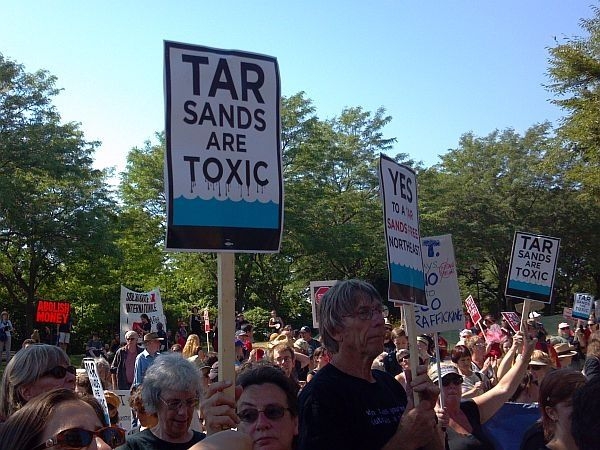
The head of a regional oil pipeline company says he’s looking for new projects, including using the line to carry controversial tar sands oil across northern New England.
The Legislature is reviewing the pipeline issue amid national protests against a project that would carry tar sands oil from western Canada to the Gulf of Mexico.
Environmentalists argue that tar sands have a larger greenhouse gas footprint than conventional oil. They warn about the risk if the pipeline breaks and the oil spills.
Green groups have raised similar concerns about an existing line that runs from the Canadian border across Vermont and New Hampshire to Portland, Maine.
The line is now used to transport conventional crude oil. Larry Wilson, the chief executive officer of the Portland Pipe Line Corporation, testified recently that the company does not have plans for a tar sands project – yet.
"It is our desire to have a project of some kind to revitalize our pipeline company and the pipeline system," Wilson told the House Fish, Wildlife and Water Resources Committee. "So we are aggressively looking at every opportunity to use these excellent assets in a way that will continue to provide for the North American energy infrastructure needs."
The National Wildlife Federation is fighting the potential project. Federation senior counsel Jim Murphy said tar sands are more dangerous than conventional oil because the heavier crude is more abrasive, is transported under higher temperatures and pressures, and is much harder to clean-up if it spills.
Murphy points to an accident two years ago that dumped one million gallons of the thick oil into the Kalamazoo River in Michigan. He said the tar sands sank to the bottom of the river, where much of it remains.
"They’ve spent more on the Kalamazoo clean-up than they’ve spent on any pipeline spill in U.S. history," Murphy said. "And EPA has basically said we can’t clean this up. This stuff is so dirty it gets into everything. That river is fouled for generations."
In 1952, the Portland pipeline spilled oil that reached the Black River in northern Vermont. Murphy said the impact of a similar spill would be far worse if the pipeline carried tar sands.
But Larry Wilson of the Portland Pipe Line Corporation told lawmakers that pipelines are the safest way to carry any kind of oil. He said the tar sands oil poses no additional danger, and does not need to be carried at hotter temperatures.
"Well, it’s crude oil. It’s a heavier oil, potentially, if we had this project," he said. "And we’ve pumped heavy oil, and we’re capable of pumping it very safely."
To carry tar sands or any crude oil east to the port of Portland, Maine, the company would need to reverse the direction of the flow. Right now the line is used to ship fuel west from Portland to a refinery in Montreal.
Wilson said flow reversal poses no particular technological challenge. He’s opposed to a bill that would require the company to get a state Act 250 land use permit if the flow is reversed.
"It seems discriminating to me, quite frankly, to discriminate against an opportunity to receive oil from our strongest, most reliable, friendliest neighbor," he said.
The House Fish, Wildlife and Water Resources Committee continues work this week on the pipeline Act 250 bill.